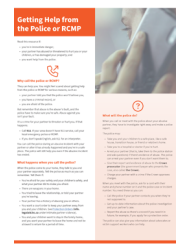Read this resource if:
- you’re in immediate danger;
- your partner has abused or threatened to hurt you or your children, or has damaged your property; and
- you want help from the police.
Why call the police or RCMP?
They can help you. You might feel scared about getting help from the police or RCMP for various reasons, such as:
- your partner told you that the police won’t believe you,
- you have a criminal record, or
- you are afraid of the police.
But remember that abuse is the abuser’s fault, and the police have to make sure you’re safe. Abuse against you isn’t your fault.
It’s a crime for your partner to threaten or hurt you. If that happens:
- Call 911. If your area doesn’t have 911 service, call your local emergency police or RCMP.
- If you don’t speak English, ask 911 for an interpreter.
You can call the police during an abusive incident with your partner or after it has already happened and you’re in a safe place. The police will still help you even if the abusive incident has ended.
When the police come to your home, they talk to you and your partner separately. Tell the police as much as you can remember. Tell them if:
- You’re afraid for your safety and your children’s safety, and what your partner did to make you afraid.
- There are weapons in your home.
- You tried to leave the relationship, or told your partner you’re leaving.
- Your partner has a history of abusing you or others.
- You want a court order to keep your partner away from you and your children. See Protection Orders.
- You and your children want to stay in the family home, and you want your partner to leave the home and not be allowed to return for a period of time.
When you call or meet with the police about your abusive partner, they have to investigate right away and make a police report.
The police may:
- Take you and your children to a safe place, like a safe house, transition house, or friend or relative’s home.
- Take you to a hospital or doctor if you’re hurt.
- Arrest your partner (that is, take them to the police station and ask questions) if there’s evidence of abuse. The police can arrest your partner even if you don’t want them to.
- Give their report and evidence of abuse to the Crown prosecutor (the government lawyer who presents the case, also called the Crown).
- Charge your partner with a crime if the Crown approves charges.
When you meet with the police, ask for a card with their name and phone number on it and the police case or incident number. You need these so you can:
- Call the police if your partner contacts you when they’re not supposed to.
- Get up-to-date information about the police investigation and your partner’s case.
- Report the abuse so there’s a record if you need it in future; for example, if you apply for a protection order.
The police can also give you information about advocates or victim support workers who can help.
If arrested, your partner can be held in custody while the police investigate. If your partner isn’t charged, they’ll be released without conditions. However, if your partner is charged:
- They may be released with no contact conditions. For example, they can’t contact you in any way and must stay away from your home and work. See When You’re Told to Have “No Contact”.
- They may be held in jail and must apply to be released; this happens at a bail hearing in court. The judge will decide if your partner can be released from jail while the police and courts deal with the criminal charges. (This is usually with no contact conditions and to not use guns, drugs, or alcohol.) Sometimes the judge will include a condition to allow indirect contact through lawyers, family justice counsellors, or mediators to arrange visits with the children or to arrange financial support.
- They may go to court and plead guilty or not guilty. In some cases, the judge may set release conditions that say your partner can’t contact you or your children, or go to your home. The judge may also say that your partner can’t use guns, drugs, or alcohol.
If you have children in your home, the police will call the Ministry of Children and Family Development (MCFD). MCFD will need to ensure your children are safe and aren’t harmed by witnessing family violence. The social worker will try to work with you to keep your children safe with you or with a family member. The social worker won’t want to separate you and your children.
If there isn’t agreement about a plan for where your children can live that’s safe, the social worker has the power to place your children in foster care or with family or friends. But MCFD would have a safety plan for returning your children to you.
Under the BC Victims of Crime Act, a person who’s been abused has a right to up-to-date information about their partner’s case. This information can include how the criminal justice system works and how the abuser’s sentence will be carried out.
If you’re having trouble getting information from the police, RCMP, or the Crown, an advocate or victim service worker may be able to help you. See Who Can Help?


